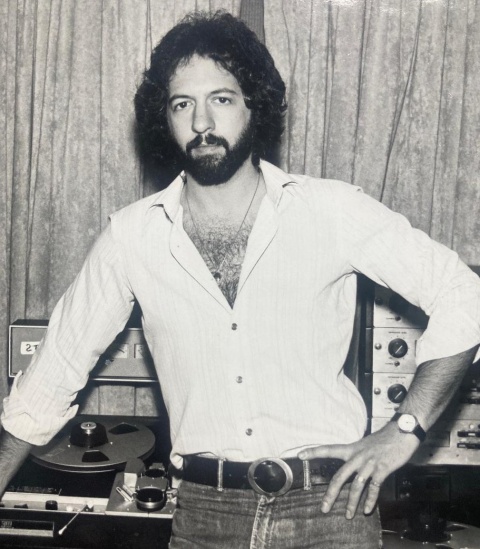Columbia College | Columbia University in the City of New York
It’s Only Rock ’n’ Roll, But Tom Werman ’67 Likes It
I


Werman today, and at the controls in the 1970s.
COURTESY TOM WERMAN ’67, BUS’69
A rock musician and devoted music lover, Werman was feeling like a fish out of water in his first “corporate” job at Grey Advertising. A friend of a friend worked in the recording industry and encouraged Werman to find his way in; Werman boldly penned a request for a meeting with Clive Davis, the president of CBS Records. It worked. Davis offered him a job at Epic Records, the smaller of CBS’ two labels.
Werman would go on to have a rocking career that spanned more than three decades. As an A&R man responsible for scouting and developing artists and songwriters, he introduced the world to Ted Nugent, REO Speedwagon and Cheap Trick (alas, Epic passed on his suggestions to sign KISS, Rush and Lynyrd Skynyrd). As a producer, he helped create 23 gold and platinum albums that sold more than 52 million copies. Now, 22 years since leaving the business, Werman has detailed these and other career highlights in his memoir, Turn It Up! My Time Making Hit Records in the Glory Days of Rock Music.
He writes that he connected strongly to music as a child: “I’ve always cherished the surrender to music and to the special emotion that can reduce a listener to tears.” His world was literally rocked by the arrival of Elvis Presley in 1955, and that was just the beginning; Werman describes his time at the College in the context of the exploding music scene: Bob Dylan and Simon & Garfunkel in his first year, then the British Invasion led by The Beatles and The Rolling Stones.
His band, The Walkers (which included Billy Cross ’68), had great success playing covers of them all. “It was the greatest time of the century as far as I was concerned,” Werman says. “Some of the best moments of my life were on stage with The Walkers.”
Though Werman had ambitions of becoming a professional musician, he attended the Business School in order to avoid being drafted. With his long hair and rocker values, Werman writes that he “felt like a stranger in a strange land”; after that seminal meeting with Davis (his intrepid letter is included in the book’s inset), Werman found that working with bands and dressing however he liked was a dream come true. “At the age of 25, the notion of having a position of responsibility in a major corporation in Manhattan and showing up to work dressed like a freak was delightful,” he writes.
He started producing albums in 1976; Werman eventually moved from Epic to Elektra and Capitol Records before going independent in the 1980s. The hit records he helped create include Cheap Trick’s bestseller Dream Police (1979); Mötley Crüe’s quadruple-platinum Girls, Girls, Girls (1987); and two five-time platinum smashes, Stay Hungry by Twisted Sister (1984) and Poison’s Open Up and Say…Ahh! (1988).
It all makes for a fun read: the bad-boy rock stars, cocaine-fueled parties and that time a wine-fortified Werman followed his idol, George Harrison, into a London men’s room. Throughout, Werman’s love for the music never wavers: “Life was divided into two parts — time when music was playing and time when it wasn’t,” he writes early on. “Hearing music made me see and feel in Technicolor; when no music was playing, life was simply black-and-white.”
But by the 1990s, grunge and alternative had sidelined hard rock and new technologies were changing music production. Eager for a new challenge, Werman produced the music and soundtrack for the film Rock Star, starring Mark Wahlberg and Jennifer Aniston, before retiring from the industry in 2001. Soon after, a friend gifted him the book Who Moved My Cheese?, about dealing with unanticipated change; it inspired Werman to reinvent himself as an innkeeper. He and his wife, Suky, ran the award-winning luxury bed-and-breakfast Stonover Farm in Lenox, Mass., until 2021.
It wouldn’t be rock ’n’ roll without interpersonal drama, and Werman does wryly recount some fallings out with former colleagues. In fact, that ire was the impetus for Turn It Up’s creation: Werman’s rebuttal to an online critique of his role on Girls, Girls, Girls led to the website’s editor offering him a series about a career in recording. After penning 18 columns, he decided to write a memoir.
But Werman’s recollections are mostly rosy. He still loves the music, and even after switching careers, enjoyed surprising Stonover Farm guests with his colorful backstory. “Maybe not everyone knew what it meant, but saying ‘I produced rock ’n’ roll records’ sounded great,” he says with a laugh.
“I personally did think it was the greatest job in the world,” he continues. “I could not have been happier anywhere else but in the producer’s chair.”
More “Online Spotlights”
- 1 of 3
- ›

